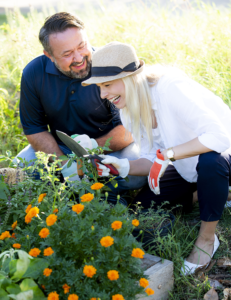Have you checked your social wellness? HSC experts say it’s key to a healthier life.
Making sure a loved one is healthy often involves checking temperature, blood pressure, and heart rate.
Now, experts at The University of North Texas Health Science Center at Fort Worth (HSC) want families and friends to add social wellness to that list.
Taking care of one’s social wellness is a growing focus nationwide as universities move to welcome students back on campuses. Experts want to educate people about what it is and its importance as people emerge from social distancing, remote learning, and quarantines related to the COVID-19 pandemic.
Dr. Maria Crompton, who practices family medicine at HSC Health and is board-certified in lifestyle medicine, said positive social connections play a large role in an individual’s whole health.
“One of the six pillars of lifestyle medicine is related to social connectedness,” Dr. Crompton said. “It is a very important part of one’s well-being.”
Dr. Crompton said that to focus on social wellness and how it ties to one’s health involves understanding the definition of wellbeing.
Relationships are especially important, she said.
“We all have this natural, innate need for connectedness,” she said. “Positive social connections help fill that need for us.”
Gaining positive health outcomes
Social connections are also proving to be medically important.
“Positive relationships can increase your longevity, your life satisfaction and quality of life, hope and happiness,” Dr. Crompton said. “It can improve our ability to cope with stress.”
Experts are finding better health outcomes attributed to having positive social connections and support groups. People with cardiovascular, endocrine, and auto-immune health conditions have experienced positive effects when they are socially healthy, Dr. Crompton said.
“On the opposite end, loneliness and social isolation are big risk factors for mortality – even perceived social isolation,” Dr. Crompton said. “You may be surrounded by a lot of people but if you feel alone in a crowded room, that can prompt pain centers in the brain that are identical to physical pain.”
Dr. Crompton said COVID-19 ushered an increase in loneliness and social isolation. Family members and friends can take some steps to ensure that loved ones in every age category are on the path to social wellness after dealing with aspects of the pandemic.
For example, teens need to be able to connect and talk with friends. Older family members and friends can benefit from a visit or a telephone call. Additionally, COVID-19 left a population either grieving lost ones or helping family members cope with long-term medical conditions.
“Almost everybody has been affected in some way,” Dr. Crompton said.
‘Reach out and we’ve got you’
Alex Cooper, Student Services Specialist with HSC’s Office of Care and Civility, said students emerging from social distancing and remote learning need to take time for self care.
“It means taking the time to know your limits when it comes to spending time with your friends or your family,” Cooper said. “If you know that you are an introvert and you have been out and about with friends or family for a couple of days, you probably know that your level there is probably drawing back and it is probably time to step away and spend some time with yourself.”
On the other hand, extroverts need to understand isolation isn’t the best idea and need to find time to spend with friends and family.
“It’s knowing how to balance self-isolation with making sure you are staying engaged and connected with people,” Cooper said. “This past year, we’ve seen a lot of students dealing with a lack of connection and that’s because they haven’t been able to be on campus and engage with their professors in person or their classmates in person.”
Cooper said HSC is trying to find ways to engage students so they don’t feel isolated.
During July, as students trickled back to campus, Cooper’s office shared helpful resources, including online activities that allow students to ease back into social situations, games, virtual movie nights, and a helpful video about relationships and emotional intelligence.
Cooper said the pandemic impacted people on many personal fronts – from health to work to education. Trying to regain a sense of normalcy requires patience with oneself and grace from others, she said.
“Be a little understanding,” Cooper said. “People are trying to get on their feet.”
Cooper said students can find assistance at HSC, which offers aid through a food pantry, student emergency fund, and the CARE Team.
“Ask someone,” she said. “Just reach out and we’ve got you.”
Tips for gaining social wellness
- Take time for self-reflection. Ask yourself these personal questions: What am I already doing that is good? Where can I improve?
- Schedule regular phone calls or dates with people in your life that make you laugh.
- Evaluate current relationships. Who can you be completely yourself with? Who makes you feel supported?
- Join a shared interest group, such a book club or running group.
- Explore a new hobby with others such as gardening.
- Exercise with others.
- Volunteer.
- Make small changes every day that strengthen and foster existing connections, such as making time to eat as a family or with a friend.
Source: Dr. Maria Crompton, DO
Looking for a new opportunity to connect with others?
Join the Walk with a Doc walking program. The group walks the 2nd Saturday of every month starting at 8 a.m. Walk Location: LVTRise, 8201 Calmont Ave. Fort Worth, Texas 76116 (Meet at the outdoor area in front of the facility).
For more information, visit: https://walkwithadoc.org/join-a-walk/locations/fort-worth-texas/





Social media